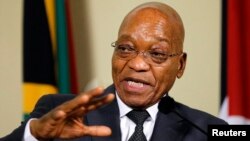South Africa's president arrived in China Wednesday for a high-level state visit, along with a crew of heavy-hitters from South Africa's top ministries. The visit is another step forward in South Africa's treasured relationship with its largest trading partner.
President Jacob Zuma’s entourage makes it clear that this is no ordinary state visit.
When the South African president landed Wednesday in Beijing for a two-day state visit (ending Friday), he was accompanied by no fewer than seven cabinet members, including the chiefs of the ministries of finance, foreign affairs, trade and industry and transport.
Zuma said in a statement that the main goal of this visit is to “ensure that our relations with China remain central to realizing our developmental agenda through our foreign policy.”
As Zuma’s spokesman Mac Maharaj says, China is a big deal. It’s South Africa’s largest single trading partner, he notes, since South Africa joined Brazil, Russia, India and China to create BRICS an economic bloc of emerging economies.
“Well, the trade between China and South Africa has been improving, and China’s investments in South Africa have reached a pretty high figure, and we want that partnership to continue," Maharaj states. "China is an important component of BRICS, and South Africa is a member of BRICS. And from that perspective as well, we wish to strengthen and deepen our relations between China and South Africa.
This visit is focused on long-term Chinese investment in South Africa’s infrastructure development.
China has expressed interest in bidding to participate in South Africa’s plan to expand its nuclear energy grid. South Africa has two nuclear reactors which supply 5 percent of its electricity in a heavily coal reliant system - which is struggling to meet growing consumer demand. In September, Russia signed a strategic partnership memorandum with South Africa on building its nuclear capacity. It could reportedly lead to a $50 billion deal for Russia to provide up to 8 nuclear reactors over the next 10 years.
South Africa also signed a nuclear cooperation deal with France in October and followed suit with China in November.
But South Africa’s growing closeness to China is not without criticism. A 2013 Pew study found South Africans have mixed feelings about China. The survey showed 46 percent of South Africans did not like the spread of Chinese ideas and customs in their country. And so, eyebrows were raised when South Africa’s education minister announced earlier this year that Mandarin would join the curriculum in some schools.
The presidency also said the two nations are discussing the recent decision to locate the BRICS Development Bank in Shanghai. The bloc decided to locate Africa’s regional center in South Africa -- a move that could make South Africa China’s new middleman -- or portal -- to Africa.




